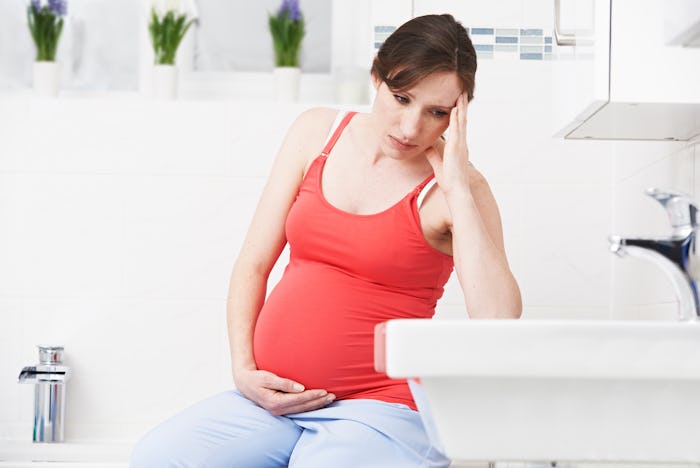Life

Should You See A Doctor If You're Spotting During Pregnancy?
Pregnancy brings on a whole laundry list of worries and questions for many moms. One of the major concerns stems from moms who find themselves spotting, or bleeding vaginally, during pregnancy — especially considering you shouldn't have your period while pregnant. So if you find yourself unnerved from unexpected bleeding, it's common to ask, "Should you see a doctor if you're spotting during pregnancy?"
Luckily, occasional spotting during pregnancy is not as uncommon or scary as most moms may initially believe. In an interview with Parents, maternal-fetal medicine specialist Dr. Alyssa Stephenson-Famy said that spotting happens in about one-third of all pregnancies and, most of the time, it's not a threat to mom or baby. Famy also added that an estimated 25 to 40 percent of moms will experience vaginal bleeding at least once during their first trimester.
Even though spotting is somewhat common and generally harmless amongst pregnant women, it doesn't mean that it's completely unassociated with a complication or that it's not a reason to schedule an appointment with your doctor. According to Mayo Clinic, it's very important to report any vaginal bleeding during pregnancy to your OB-GYN or health care provider. It's also important to take into account what trimester of pregnancy you're in when considering the urgency with which you need to report spotting. Mayo Clinic shared that during your first trimester, you can wait to tell your doctor about light spotting at your next prenatal appointment if vaginal bleeding doesn't last longer than one day. If spotting occurs in your second trimester, you should contact your doctor that day, and immediately during the third trimester. Keep in mind however, that pinkish or bloody discharge during the end of your pregnancy could also be a sign of labor.
Regardless of trimester, it's important to know there are other signs that may accompany spotting that indicate you need to contact your doctor immediately. In an interview Parents, certified nurse-midwife Chris A. Beard said while spotting, it's important to pay attention to color, amount, frequency, and any other symptoms that may occur. Beard suggested contacting your doctor immediately if you have larger than dime-sized drops of blood, if blood is bright red versus darker red or brown, if vaginal bleeding is a medium to heavy flow, or if spotting is accompanied by cramps, stomach pain, or fever. These warning signs can indicate a miscarriage, subchorionic hemorrhage, placenta previa, or chemical, ectopic, or molar pregnancy. However, if you don't seem to be affected by any of the above warning signs, there are some benign causes for spotting during pregnancy as well.
Some other less serious causes of spotting for many women include sex, vaginal exams, infection, implementation bleeding (implantation of the embryo into your uterine wall), or blood that accumulates around or within the folds of the placenta called a subchorionic bleed, according to What To Expect. All of these causes generally resolve themselves, are harmless, and can be addressed with your doctor if they persist or cause any concern for you.
If you do experience some spotting throughout your pregnancy, especially within the first trimester, remember that it's not uncommon nor a reason to go into immediate panic. Consider the warning signs and, if you're not displaying any of them, think about how you want to comfortably move forward. If you're still concerned, call your doctor or consider moving up your next prenatal appointment. Also keep in mind that if you do experience warning signs or spotting in the second or third trimester, you do want to contact and see a doctor immediately instead of waiting.